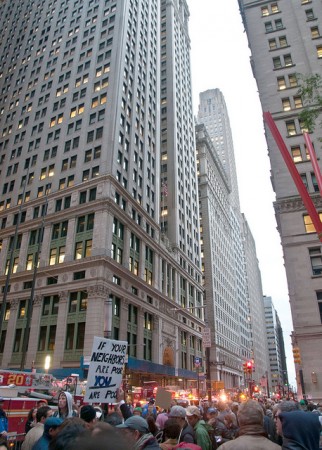
The 6-month anniversary of the Occupy movement in the United States brought much rhetoric along with promises of the blossoming of an American Spring. From elections to high-profile summits, 2012 will be a busy year for protesters. Meanwhile, the U.S. government and local governments will no longer be caught flat-footed in response, and are gearing up for a year of civil unrest.
Nowhere will local restrictions on protest be more publicly displayed than in Chicago next month. As the city prepares to host the NATO Summit, Occupiers are making plans for hundreds of thousands of protesters to descend on the city in order to speak out against international displays of violence by NATO forces and the “effects of the economic crisis caused by the leaders” who will be gathering in the city.
Adbusters, the Canadian magazine credited with creating the Occupy Wall Street idea that exploded into local protests adopting the Occupy “brand” around the world, sent an email out to supporters laying out goals and tactics for their time in the Windy City. “With a bit of luck, we’ll pull off the biggest multinational occupation of a summit meeting the world has ever seen,” they wrote, while encouraging followers to utilize the #OccupyChicago Twitter hashtag. “We the people will set the agenda for the next few years and demand our leaders carry it out. And if they ignore us and put our demands on the back burner like they’ve done so many times before…we’ll flashmob the streets, shut down stock exchanges, campuses, corporate headquarters and cities across the globe.”
There has been enough concern over the potential unrest in the face of these protests, that President Obama announced he would move the conference of G8 leaders out of the metropolis and to Camp David in rural Maryland, where no protesters will be allowed near. Chicago police have been undergoing heavy training, with assistance and funding from the Department of Homeland Security, in anticipation of the crowds. Mayor Rahm Emanuel’s government has been stingy about handing out parade and demonstration permits, garnering criticism from Occupiers and their sympathizers who see the build-up of forces as unjustly restricting dissent.
Chicago is not the only “occupied” city that has sought to limit the free expression of the movement’s ideas. From Honolulu, Hawaii to Charlotte, North Carolina, cities across the U.S. are turning to legal measures – effectively outlawing occupation or overnight camping of public spaces. However, these ordinances have come under heavy criticism for being entirely politically motivated and enacted in response to a Constitutionally protected expression of speech. The ordinances against overnight camping apply only to actions with an overt political message – those wishing to camp in line to buy the latest book, movie, or gadget are still welcomed. It is likely these ordinances will be challenged in court eventually, but in the meantime, the Occupy movement will be running up against politically motivated restrictions on its tactics and message.
On the national level, the U.S. government has responded to the new protest tactics by clamping down on zones under its jurisdiction. H.R. 347, somewhat conspiratorially known as the “Trespass Bill”, limits the forms of protest allowable near a figure protected by the Secret Service or government property in Washington, DC. Walking into an area deemed to be under Secret Service protection, even if you do not know it is under their jurisdiction at the time, is a felony offense, as is protesting outside events deemed to be of “national significance.” Unless a brave protester wants to risk time in a federal penitentiary, no more will glitter-bombing presidential candidates or performing sit-ins of Congressional office buildings be acceptable tactics.
These responses from local and national authorities may have somewhat limited the plans Occupy had to speak truth to power, but only when the powers-that-be hold high-level government positions. Since its 6-month anniversary, Occupy has shifted its focus from appealing directly to Congress and attacking the monolithic Wall Street, to rather zeroing in on the Department of Education, the Environmental Protection Agency, and individual banks accused of foreclosing on middle class American homes after taking bail-out money.
That is not to say national politics will no longer be a target of the Occupy movement. With both the Republican and Democratic National Conventions scheduled during this year’s election season following the NATO and G8 summits, it is certain that the government and Occupiers will clash more often than not. How each side evolves in these clashes still remains to be seen.
Chrisella Sagers is Managing Editor at the Diplomatic Courier.
For further content on the Occupy movement, check out the following articles:
Global Financial Regulation: A Goal Many Espouse But Can It Be Done?

